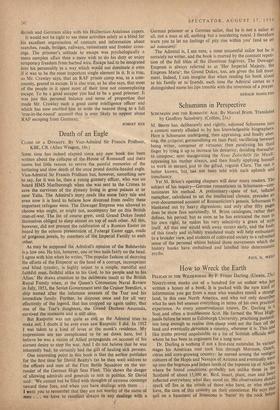Death of an Eagle
CLOSE Or A DYNASTY. By Vice-Admiral Sir Francis Pridham, KBE, CB. (Allan Wingate, 18s.)
SOME time has indeed elapsed since any new book has been written about the collapse of the House of Romanoff and there seems but little reason to revive the painful memories of the torturing and slow death of the once proud double-headed eagle. Vice-Admiral Sir Francis Pridham has, however, something new to say, for it was he, then a young gunnery officer, who was on board HMS Marlborough when she was sent to the Crimea to save the survivors of the dynasty living in great palaces at or near Yalta. The Admiral's story reads like some fairy tale and even now it is hard to believe how divorced from reality these important refugees were. The Dowager Empress was allowed to choose who might, or might not, accompany her on this British man-of-war. The list of course grew, until Grand Dukes found themselves obliged to sleep almost on top of each other. All this, however, did not prevent the celebration of a Russian Easter on board by the solemn presentation of Faberg6 Easter eggs, made of gorgeous jewels, by members of the Imperial Family to each other.
As may be supposed the Admiral's opinion of the Bolshevists is a low one. He hits, however, one or two nails fairly on the head. I agree with him when he writes, 'The popular fashion of decrying the efforts of the Emperor as the head of a corrupt, incompetent and blind tyranny, is highly unjust to a simple, merciful and faithful man, faithful alike to his God, to his people and to his Allies.' He draws attention to the deliberate insult to the British Royal Family when, at the Queen's Coronation Naval Review in July, 1953, the Soviet Government sent the Cruiser Sverdlov, a ship named after the infamous assassin of the Tsar and his immediate family. Further, he disposes once and for all very effectively of the legend, that has cropped up again today, that one of the Tsar's daughters, the Grand Duchess Anastasia, survived the massacre and is still alive.
But Rasputin was not quite as evil as the Admiral tries to make out. I doubt if he ever even saw Rasputin. I did. In 1912 I was taken to a kind of levee at the monk's residence. My impressions are too complicated to be set down here, but I believe he was a victim of Allied propaganda on account of his earnest desire to stop the war. And I do not believe that he was inherently bad; he certainly had the gift of healing sick persons.
One interesting point in this book is that the author publishes for the first time Sir David Beatty's (as he then was) address to the officers and men of the First Battle Squadron on the sur- render of the German High Seas Fleet. This shows the danger of allowing admirals and generals to mix in politics. Sir David said : 'We cannot but be filled with thoughts of extreme contempt toward these foes, and when you have dealings with them . . . I want you to remember that they are not worthy of the name of men . . . we have to recollect always in any dealings with a
German prisoner or a German sailor, that he is not a sailor at all, not a man at all, nothing but a murdering rascal. I therefore warn you to let no feelings of pity rise within you' (and so on ad nauseam)!
The Admiral is, I am sure, a most successful sailor but he is certainly no writer, and the book is marred by the constant repeti- tion of the full titles of the illustrious fugitives. The Dowager Empress is always referred to as 'Her Imperial Majesty, the Empress Marie'; the Grand Dukes, too, are given the full treat- ment. Indeed, I can imagine that when reading his book aloud to his family or to friends. each time the Admiral comes to a distinguished name his lips tremble with the reverence of a prayer.
GERALD HAMILTON


































 Previous page
Previous page